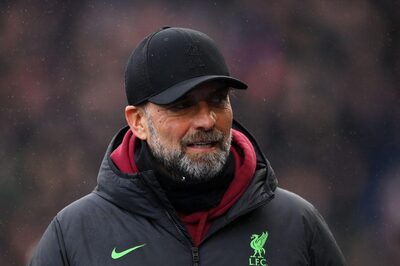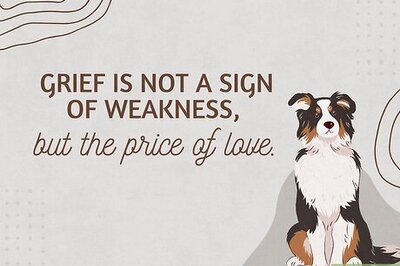
views
The compelling popularity of the game leads Kofi Annan to confess, "the word cup makes us at the UN green with envy". On the other hand, the world cup also re-ignites the debate about the conflation of sport with nationalism and the possible ill-effects of this mixture. A famous proponent of the latter thesis was George Orwell who noted, "Serious sport has nothing to do with fair play, it is bound up with hatred and jealousy, boastfulness, disregard of all the rules and sadistic pleasure in unnecessary violence... it is war minus the shooting.". National anthems with fierce tribal pride are sung first and a ninety minute battle follows.
Orwell's observation has a partial ring of truth to it. There is a threat of an emotional overspill in a country after a defeat in a crucial match causing acts of criminality by its overzealous supporters. Sometimes, this has fatal consequences. Soon after the 1994 world cup, the Colombian defender Andreas Escobar was tragically shot dead for scoring a self-goal that prevented Colombia's progress in the tournament. Football has also precipitated a war: Ryszard Kapuscinski's "The Soccer War" provides a searing eye-witness account of the six day war between El Salvador and Honduras triggered by a qualifying game in 1969. Xenophobic elements and lager laden football hooligans also do their bit to advertise a negative image for the game.
Yet despite some of the unpleasantness that can be generated, football is greater than the sum of a few unruly individuals. On and off the pitch, there will always be some who dutifully abide by the Macbethian chorus of "fair is foul and foul is fair". However, the uglier side of the game pales into the background against the sublime skills of the players on display and the genuine and peaceful affections of the vast majority of the fans worldwide. The glorious crest and troughs of a free flowing game showcases the vivid range of human expressions from anguish to joy and felicitates a never-say-die work ethic. In so doing, football is perhaps an emblem of the elemental complexity of life itself.
Football is often trumpeted as the beautiful game. However, more than just being a beautiful game, it is also the game that speaks in a universal language: It is the global game. From Italy to the Ivory Coast, the global reach of the game is confirmed by the diversity of the participating teams. The game is also a powerful celebration of human skill and achievement, irrespective of origins and skin colour. This has the capacity to affect societal attitudes and in helping to bury myths and prejudices. France's win in 1998 with the brilliant Zidane at the helm is a prime illustration of how football has raised the profile of ethnic minorities in that country.
In India, the game is enjoying a viewership boom under the patronage of the middle classes and cable television. For a younger generation, international football leagues such as the Premiership in England or the Italian Serie A are creating some of their memorable sporting images. About four years ago, a school friend of my youngest sibling bought him an Italian jersey bearing Totti's signature: He persisted on wearing it through the summer at every opportunity, even to familial functions! Last year when I fetched him a Wayne Rooney jersey, the collegiate student could still scarcely contain his impish delight.
However, this increased middle class following in India should not obscure us from the fact that one of the key features behind football's global appeal lies in its ability to cut across class consciousness. For instance, unlike cricket that evolved primarily as a public school game in England, football has exercised a far wider influence, almost as a counterfactual movement to cricket's privileged origins. Indeed, when John Lennon eulogised "a working class hero is something to be", he might just have had a football star in mind.
Football is a great leveller. On the pitch, skill reigns supreme. All else is secondary. Hence, Ghana with a per capita income of $290 a year makes it to the knock-out stage while the mighty United States with a per capita income of $40,000 does not. Football brings more people together than it divides. Perhaps the ultimate compliment to this global game is that millions of us without a national team of our own to support in the world cup, still passionately tune in, enjoying this veritable moveable feast for its own sake.
********
Rishabh Bhandari is a lawyer at a global law firm in London. These are his personal views.first published:June 26, 2006, 13:18 ISTlast updated:June 26, 2006, 13:18 IST
window._taboola = window._taboola || [];_taboola.push({mode: 'thumbnails-mid-article',container: 'taboola-mid-article-thumbnails',placement: 'Mid Article Thumbnails',target_type: 'mix'});
let eventFire = false;
window.addEventListener('scroll', () => {
if (window.taboolaInt && !eventFire) {
setTimeout(() => {
ga('send', 'event', 'Mid Article Thumbnails', 'PV');
ga('set', 'dimension22', "Taboola Yes");
}, 4000);
eventFire = true;
}
});
window._taboola = window._taboola || [];_taboola.push({mode: 'thumbnails-a', container: 'taboola-below-article-thumbnails', placement: 'Below Article Thumbnails', target_type: 'mix' });Latest News
Unless you prefer a reclusive and hermetically sealed existence from the everyday occurrences around the globe, you will have noticed that the football world cup is everywhere. It is on the front and back-pages of the national dailies and tabloids, on the airwaves, on billboards and on the internet. But most importantly, it is present in our living rooms, in our animated banter at work, in classrooms and beyond. More than just an event, the world cup is a phenomenon because it captures the hearts and minds of millions across geographical borders.
The compelling popularity of the game leads Kofi Annan to confess, "the word cup makes us at the UN green with envy". On the other hand, the world cup also re-ignites the debate about the conflation of sport with nationalism and the possible ill-effects of this mixture. A famous proponent of the latter thesis was George Orwell who noted, "Serious sport has nothing to do with fair play, it is bound up with hatred and jealousy, boastfulness, disregard of all the rules and sadistic pleasure in unnecessary violence... it is war minus the shooting.". National anthems with fierce tribal pride are sung first and a ninety minute battle follows.
Orwell's observation has a partial ring of truth to it. There is a threat of an emotional overspill in a country after a defeat in a crucial match causing acts of criminality by its overzealous supporters. Sometimes, this has fatal consequences. Soon after the 1994 world cup, the Colombian defender Andreas Escobar was tragically shot dead for scoring a self-goal that prevented Colombia's progress in the tournament. Football has also precipitated a war: Ryszard Kapuscinski's "The Soccer War" provides a searing eye-witness account of the six day war between El Salvador and Honduras triggered by a qualifying game in 1969. Xenophobic elements and lager laden football hooligans also do their bit to advertise a negative image for the game.
Yet despite some of the unpleasantness that can be generated, football is greater than the sum of a few unruly individuals. On and off the pitch, there will always be some who dutifully abide by the Macbethian chorus of "fair is foul and foul is fair". However, the uglier side of the game pales into the background against the sublime skills of the players on display and the genuine and peaceful affections of the vast majority of the fans worldwide. The glorious crest and troughs of a free flowing game showcases the vivid range of human expressions from anguish to joy and felicitates a never-say-die work ethic. In so doing, football is perhaps an emblem of the elemental complexity of life itself.
Football is often trumpeted as the beautiful game. However, more than just being a beautiful game, it is also the game that speaks in a universal language: It is the global game. From Italy to the Ivory Coast, the global reach of the game is confirmed by the diversity of the participating teams. The game is also a powerful celebration of human skill and achievement, irrespective of origins and skin colour. This has the capacity to affect societal attitudes and in helping to bury myths and prejudices. France's win in 1998 with the brilliant Zidane at the helm is a prime illustration of how football has raised the profile of ethnic minorities in that country.
In India, the game is enjoying a viewership boom under the patronage of the middle classes and cable television. For a younger generation, international football leagues such as the Premiership in England or the Italian Serie A are creating some of their memorable sporting images. About four years ago, a school friend of my youngest sibling bought him an Italian jersey bearing Totti's signature: He persisted on wearing it through the summer at every opportunity, even to familial functions! Last year when I fetched him a Wayne Rooney jersey, the collegiate student could still scarcely contain his impish delight.
However, this increased middle class following in India should not obscure us from the fact that one of the key features behind football's global appeal lies in its ability to cut across class consciousness. For instance, unlike cricket that evolved primarily as a public school game in England, football has exercised a far wider influence, almost as a counterfactual movement to cricket's privileged origins. Indeed, when John Lennon eulogised "a working class hero is something to be", he might just have had a football star in mind.
Football is a great leveller. On the pitch, skill reigns supreme. All else is secondary. Hence, Ghana with a per capita income of $290 a year makes it to the knock-out stage while the mighty United States with a per capita income of $40,000 does not. Football brings more people together than it divides. Perhaps the ultimate compliment to this global game is that millions of us without a national team of our own to support in the world cup, still passionately tune in, enjoying this veritable moveable feast for its own sake.
********
Rishabh Bhandari is a lawyer at a global law firm in London. These are his personal views.


















Comments
0 comment